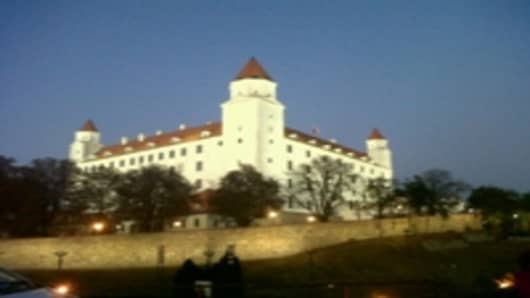As the euro zone debt crisis weighs on the German "strong man of Europe", its slowdown puts Eastern Europe's growth at risk too, analysts told CNBC.
(Read More: Europe's Paymaster Heading for Recession: Economists)
Germany has been the biggest single trading partner of the Czech Republic, Slovakia, Hungary, Poland and Slovenia since the fall of the Berlin Wall, with around 25 percent of Polish exports and 30 percent of Czech exports bound for Germany in 2011, according to Moody's Investors Service.
In consequence, those Eastern European countries with export-driven economies, such as the Czech Republic and Slovakia, are vulnerable to fluctuations in German demand, said Katarzyna Rzentarzewska, an analyst at Erste Bank, one of the biggest players in Eastern Europe.
"It is definitely true that the Czech Republic and Slovakia and to some extent, Hungary, are heavily exposed to Germany," said Rzentarzewska.
"I would not say that Poland is heavily exposed to German performance, as in Poland, domestic demand was historically the pillar of growth… All the Eastern European economies are impacted by the recession in the euro zone and the slowing German economy, but the degree of impact is different."
According to the OECD (Organisation for Economic Co-operation and Development), both the Czech Republic and Slovakia had export-to-gross domestic product (GDP) ratios in 2011 of 79.3 percent and 80.9 percent respectively, well above the European Union average of 40.5 percent.
Despite a more modest export-to-GDP ratio of 41.5 percent, Polish Finance Minister Jacek Rostowski told CNBC the country's economy is "obviously a hostage to Europe… Forty percent of our GDP is exports."
Although Poland has remained a strong performer throughout Europe's debt crisis, Polish GDP growth flagged in second quarter 2012 to 2.4 percent from 3.5 percent in the first quarter.
"The main reasons behind the slowdown are 1) recession in the euro zone and slowdown in Germany, and 2) a post-Euro 2012 championship slowdown of public investments," said Rafal Benecki, the chief Poland economist at ING Financial Markets.
"Weak investment, as well as weak consumption (wages are growing slower than inflation), contribute to the weakness of domestic demand."
ING forecasts Poland will grow by 2 percent year-on-year in 2012 and 1.6 percent in 2013, down from 4.3 percent in 2011.
"1.6 percent growth in 2013 looks okay if you compare it to other euro zone and European Union members, but for Poland this is weak result," said Benecki.
One sector feeling the impact of the weaker German economy is the automotive industry, a substantial driver of growth and employment in the region (in the Czech Republic alone, it employs 260,000 people, with manufacturers present including Hyundai, Skoda and Toyota Peugeot Citroen).
"The automotive industry is highly dependent on foreign demand, as the majority of vehicles produced are exported, primarily to other European Union countries," said Moody's Analyst Jaime Reusche in a report on the sector.
Regarding Slovakia in particular, Reusche wrote: "Strong demand from Germany and Asia for cars manufactured in Slovakia supports economic activity, and makes the country an important production hub within the region."
"Nevertheless, an increasingly high reliance on external demand from E.U. countries poses risks to the medium-term growth outlook." Slovak automotive production fell in 2011 to 174,000, down from 211,000 in 2010.
However, Poland's less export-orientated economy means its automotive sector is comparatively sheltered from external slowdown.
"Despite a declining trend in vehicle production, Poland's economy continues to be one of the strongest performers in the E.U.… This stability highlights Poland's greater diversification and robust growth model, which is driven by internal demand," wrote Reusche.
— By CNBC.com's Katy Barnato



